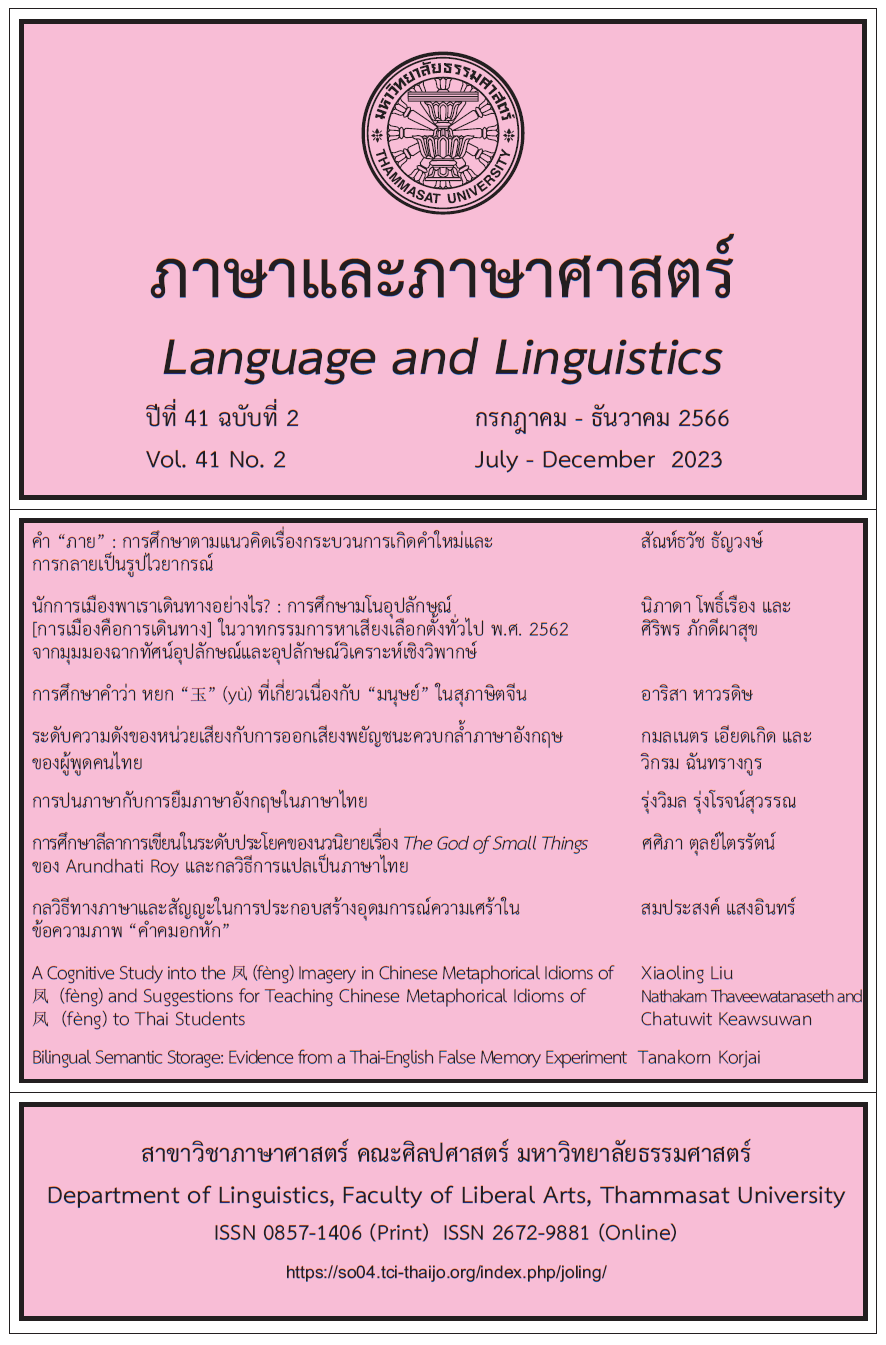A Stylistic Study on the Syntactic Level of Arundhati Roy’s The God of Small Things and Translation Strategies in the Thai Translated Version
Main Article Content
Abstract
Style is one of the most important literary elements in literature. It reflects the author’s identity and unique way of writing. Therefore, a stylistic study is an interesting and important topic for linguistic analysis. The objectives of this research are to identify and analyze: 1) the writing styles at the syntactic level that are related to the post-colonial concept in Arundhati Roy's The God of Small Things, and 2) the translation strategies used by the Thai translator, Sodsai, including analyzing which strategies help to maintain the meaning and the author’s unique writing styles at the syntactic level. The results reveal that the samples of the writing style at the syntactic level related to the post-colonial concepts can be divided into seven categories: passive voice sentences, active voice sentences, English-Malayalam code-switching, using the tag “isn't it” in every context, negative sentences, sentences with similes and metaphors, and topicalization. The translator applied various translation strategies including literal translation, adaptation, unit shift, loan translation, colloquialization, neutralization, level shift, addition, omission, pronominalization, and nonpronominalization to convey the meaning and maintain the specific style.
Article Details

This work is licensed under a Creative Commons Attribution-NonCommercial-NoDerivatives 4.0 International License.
บทความทุกบทความเป็นลิขสิทธิ์ของภาษาและภาษาศาสตร์
References
อรุณธตี รอย (2550). เทพเจ้าแห่งสิ่งเล็ก ๆ (สดใส, ผู้แปล) (พิมพ์ครั้งที่ 1). มูลนิธิเด็ก. (ต้นฉบับพิมพ์ปี 1997).
ราชบัณฑิตยสถาน. (2554). พจนานุกรม ฉบับราชบัณฑิตยสถาน พ.ศ. 2554. https://dictionary.orst.go.th/
ศานติ ภักดีคำ. (2561). “ตะแลงแกง” คำนี้มาจากไหน? ไฉนจึงเป็น “แดนประหาร”?. https://www.silpa-mag.com/history/article_19070
สัญฉวี สายบัว. (2528). หลักการแปล (พิมพ์ครั้งที่ 2). สำนักพิมพ์มหาวิทยาลัย ธรรมศาสตร์.
อมรา ประสิทธิ์รัฐสินธุ์. (2540). ภาษาในสังคมไทย. โรงพิมพ์แห่งจุฬาลงกรณ์มหาวิทยาลัย.
Ashcroft, B., Griffiths, G., & Tiffin, H. (2007). Post-colonial studies: The key concept (2nd ed.). Routledge.
Berezowski, L. (1996). Dialect in translation. Acta Universitatis Wratislaviensis.
Bohner, G. (2001). Writing about rape: Use of the passive voice and other distancing text features as an expression of perceived responsibility of the victim. British Journal of Social Psychology, 40, 515-529.
Boudour, N. (2017). Otherness in translation: Postcolonial Arabic novel translated into English [Master’s dissertation, University of Guelma]. DSpace.
Cambridge dictionary. (2020). https://dictionary.cambridge.org/
Chesterman, A. (2006). Memes of translation: The spread of ideas in translation theory. John Benjamins Publishing.
Ding, Y. (2013). A quantitative analysis of words with implied negation in semantics. Theory and Practice in Language Studies, 3, 1200-1208.
Frazer, A. K., & Miller, M. D. (2009). Double standards in sentence structure: Passive voice in narratives describing domestic violence. Journal of Language and Social Psychology, 28, 62-71.
Fredrickson, B. L., & Roberts, T.-A. (1997). Objectification theory: Toward understanding women's lived experiences and mental health risks. Psychology of Women Quarterly, 21, 173-206.
Collins COBUILD idioms dictionary. (2012). Collins Educational.
Hernandez, I. (2021). Workers Unite! https://fvinstitute.org/workers-unite/
Jadoon, N. (2017). Abrogation and appropriation of English in Arundhati Roy’s The God of Small Things. Research Scholar, 5, 6-18.
Leech, G., & Short, M. (2007). Style in fiction: A linguistic introduction to English fictional prose. Pearson Education.
Mambrol, N. (2016). Postcolonialism. Literariness. https://literariness.org/2016/04/06/postcolonialism/
Mukherjee, S., & Mohanty, D. A. (2020). Role of code-switching and code-mixing in indigenous communicative contexts: A study of The God of Small Things. Rupkatha Journal on Interdisciplinary Studies in Humanities, 12, 1-11.
Longman dictionary of contemporary English (6th ed.). (2014). Pearson Education.
Roy, A. (1997). The God of Small Things. Random House.
Sailaja, P. (2009). Indian English. Edinburgh University Press.
Sládková, P. (2013). Non-standard English varieties in literary translation: The help by Kathryn Stockett [Master’s diploma thesis, Masaryk University]. Masaryk University Information System. https://is.muni.cz/th/261866/ff_m/Sladkova_Diploma_Thesis.pdf
Spitzer, L. (1948). Linguistics and literary history. Princeton University Press.
Talib, I. S. (2002). The language of postcolonial literatures: An introduction. Routledge.
Thamarana, S. (2015). Significance of studying postcolonial literature and its relevance. Journal of English Language and Literature, 3, 537-541.


